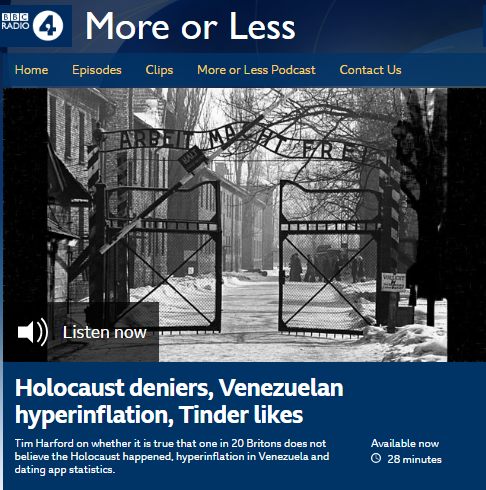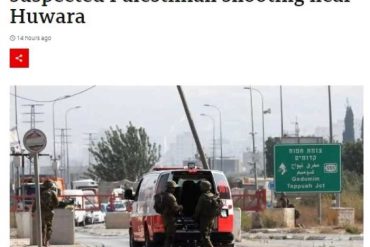The lead item (from 00:28 here) in the February 3rd edition of the BBC Radio 4 statistics programme ‘More or Less’ related to the results of a survey published a few days earlier by Britain’s Holocaust Memorial Day Trust that was previously covered on the BBC News website.
“Is it true that one in 20 adults in Britain don’t believe the Holocaust took place? Those are the findings of a survey commissioned by The Holocaust Memorial Day Trust. But Professor Peter Lynn of Essex University explains why the survey is unlikely to be accurate.”
Presenter Tim Harford introduced the item:
Harford: “Last Sunday was Holocaust Memorial Day; a day of solemn remembrance. But it was also a day of appalled surprise because a poll was published claiming that [recording] ‘as many as one in 20 adults in Britain don’t believe the Holocaust took place and 1 in 12 believe its scale had been exaggerated’.
One in 20 Britons: that would be about three million people not believing that the Holocaust happened. The survey said that many others were confused about the details.
So to clear up any uncertainty, at least here, the Holocaust is a name given to the genocidal murder of around 6 million Jews led by the German State under Adolf Hitler’s Nazi government and part of an even bigger policy of systematic murder of a variety of targets including the Roma, disabled people, political prisoners and many others.
We’ve always known that a few people love to claim that this never happened or happened on a dramatically smaller scale – but as many as one in twenty?”
Programme producer Ruth Alexander subsequently brought in Peter Lynn, Professor of Survey Methodology at the University of Essex.
Alexander: “Now when Professor Lynn heard about the results of this survey, he raised an eyebrow.”
Lynn: “Yes, I was immediately sceptical that this sounded a bit…ehm…unlikely.”
Alexander: “The number sounds too big?”
Lynn: “Yes.”
With no identification of the additional experts cited, listeners were told that survey participants may have unintentionally stated that the Holocaust did not happen:
Alexander: “In fact, I’ve spoken to three other survey design experts – they all agree, there are some serious flaws with this study. Now it’s true that 5% of people surveyed agreed or strongly agreed with the statement that the Holocaust never really happened. However, Professor Lynn thinks they may not all have done so deliberately.”
Lynn: “I guess the first thing that struck me was that the wording of the question about believing that the Holocaust happened seems to me to have some serious shortcomings and I think that may have caused some people to appear to agree that the Holocaust had never really happened when that wasn’t what they intended.”
Harford: “So the issue here is that people taking part in an online survey like this; they’re ticking boxes, maybe they’re not looking too closely; maybe they’re in a hurry, they’re distracted by what’s on TV; they’re thinking more about the shopping vouchers they might receive for doing the survey than what they’re actually agreeing or disagreeing with and some of them might make outrageous claims just for the fun of it.”
Later on listeners were told that the result may have come about by accident.
Lynn: “There is always a significant minority of respondents who take short cuts and I think that that could be the case here because the respondents here are presented with a series of statements. Now the first two items in this scale are firstly: ‘It is important to know about the Holocaust in today’s world’ and secondly: ‘More needs to be done to educate people about what happened during the Holocaust’. So, at that point you might be beginning to think, ah I can see a battery of statements about the Holocaust, seems like I’m the kind of person who tends to agree with them; I’ll just agree to the next few and assume that that represents my position.
But the item we’re talking about here, the third item ‘the Holocaust never really happened’ is worded the other way round – it’s what we call a reversed item – where if you believe that the Holocaust happened, you should now be disagreeing with the item. So you could easily fall into the trap of just assuming you agreed with all these items and, therefore, not giving a response to this third item that actually represents your true view.”
With the programme makers’ views of the intelligence of the British public abundantly clear, Harford continued:
Harford: “It seems like there is a lot of ignorance out there and clearly Holocaust denial is a real thing and it would be worth trying to measure how prevalent it is. So do we know of any other, perhaps more reliable, research that can give us a better sense of the true numbers?”
Alexander went on to cite a study conducted twenty-five years ago in the United States (which obviously has no bearing on the issue of Holocaust denial in Britain) and to quote yet more anonymous experts on Holocaust denial in an equally unrelated location.
Alexander: “…it turned out that the correct number of Holocaust Deniers in the US was more like 2% of the population. And experts have told me that studies in Europe have tended to give lower numbers still.”
Apparently the ‘More or Less’ team would have the BBC’s domestic listeners conclude that a study conducted a quarter of a century ago in a country with a different culture, education system and population make up is more likely to reflect the percentage of people in their own country who do not believe that the Holocaust happened than a survey recently conducted in the UK.
Related Articles:
BBC Radio 4’s ‘More or Less’ does damage control on Gaza casualty figures article




